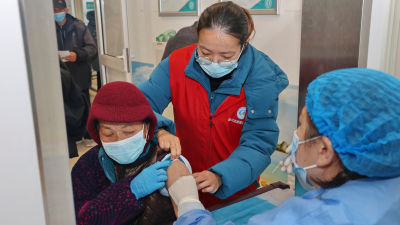China pays over-60s to have Covid jab as cases spread rapidly

Chinese authorities are going door to door, attempting to pay over-60s to get vaccinated against Covid-19.
Even as infections rip through the country at an alarming rate, many are still hestitant to get the jab over fears of potential side effects such as fevers and blood clots.
China kept cases far lower than most countries for years with its zero-Covid policy, but abruptly abandoned the hardline stance earlier this month in the face of widespread protests.
As infections were kept so low for so long with harsh lockdown measures, many in the People's Republic didn't feel the need to get vaccinated as they had less chance of catching the virus.
While China says its official vaccination rate is 90%, only about two-thirds of those over 80 have had the jab, with only 40% receiving a booster shot. Among all age groups, only 57.9% of adults have been boosted.
There is also a relative lack of natural immunity due to so few people being exposed to the virus until now.
The sudden shift in rules has flooded China's hospitals with patients, with experts predicting 1 to 2 million Covid deaths through the end of 2023.
The National Health Commission announced a campaign on November 29 to raise the vaccination rate among older Chinese people, which health experts say is crucial to avoiding a healthcare crisis.
It's also the biggest hurdle before the ruling Communist Party can lift remaining Covid restrictions.
The health commission has recorded only six Covid-19 fatalities this month, bringing the country’s official toll to 5,241. That is despite multiple reports by families of relatives dying.
China only counts deaths from pneumonia or respiratory failure in its official Covid-19 toll, a health official said last week.
That unusually narrow definition excludes many deaths other countries would attribute to the virus.
Neighbourhood committees that form the lowest level of government have been ordered to find everyone 65 and older and keep track of their health.
They are doing what state media call the “ideological work” of lobbying residents to persuade elderly relatives to get vaccinated.
In Beijing, the Liulidun neighborhood is promising people over-60s up to 500 yuan (£60) to get a two-dose vaccination course and one booster.
Want a quick and expert briefing on the biggest news stories? Listen to our latest podcasts to find out What You Need To Know.
The National Health Commission announced on December 23 that the number of people being vaccinated daily had more than doubled to 3.5 million nationwide.
But that still is a small fraction of the tens of millions of shots that were being administered every day in early 2021.
Older people are put off by potential side effects of Chinese-made vaccines, for which the government hasn't announced results of testing on over-60s.
Some are reluctant because they have diabetes, heart problems and other health complications.
This is despite warnings from experts that the risks of Covid-19 are more serious than potential vaccine side effects in almost everyone.
“Now, the families and relatives of the elderly people should make it clear to them that an infection can cause serious illness and even death,” said Jiang Shibo of the Fudan University medical school in Shanghai.
According to its 2020 census, China has 191 million people aged 65 and over - a group that, on its own, would be the eighth most populous country, ahead of Bangladesh.
Shanghai news outlet, The Paper, said: “Coverage rates for people aged over 80 still need to be improved...The elderly are at high risk.”